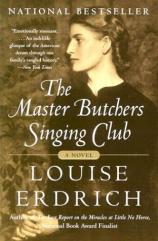Reading Group Guide
Discussion Questions
The Master Butchers Singing Club

1. "Ever since he was a child, when sorrow had come down upon him, he'd breathed lightly and gone motionless. As a young soldier, he'd known from the first that in his talent for stillness lay the key to his survival." (p. 2) What clues does this passage give us about Fidelis's personality and his means of coping with tragedy later in life?
2. Erdrich offers glimpses of both Fidelis's and Cyprian's experiences of war. How are they similar and different? What role did war play in developing each man's personality?
3. Erdrich explores different kinds of strength in her novel, most significantly Fidelis's rigidity and Cyprian's ability to balance. How do the novel's themes draw on the differences between these two men's physical prowess?
4. In her vaudeville act with Cyprian, Delphine becomes a "table," supporting Cyprian and a number of pieces of furniture on her torso. What is the significance of Delphine's role as a table? How does her strength impact the lives of those around her?
5. Each of the main characters in the novel possesses a particular kind of power that both identifies them and helps them through difficult times. What are the various kinds of power Erdrich writes about? Is one kind better than another? What kinds of power do you possess?
6. Fidelis and Eva redistribute the byproducts of their butchering throughout the town: to people, to animals, and to the ground. How is the theme of recycling scraps of life carried through? Who continues this cycle of recovering discarded objects?
7. Fidelis's son, Marcus, narrowly escapes death when he is buried alive in a mound of dirt. What does this event tell you about Marcus, his father, and Cyprian? Who--and what--else is buried in this novel? What is Erdrich saying about earth, about death, and about life in this scene?
8. How does Erdrich make use of the novel's setting? How does North Dakota's climate, history, and terrain impact the lives of Argus's citizens?
9. Before she dies, Eva takes a plane flight over Argus with her son, Franz. During the flight, she has a revelation: "We are spots. Spots in the spot. No matter. We specks are flying on our own power. We are not blown up there by wind!" (p. 118) She goes on to say, "Death is only part of things bigger than we can imagine. Our brains are just starting the greatness, to learn how to do things like flying. What next? You will see, and you will see that your mother is of the design. And I will always be made of things, and things will always be made of me. Nothing can get rid of me because I am included into the pattern." How do these passages relate to Erdrich's themes of interconnection, power, and heritage? How might Eva's revelations run counter to the beliefs of her family and neighbors? How do they correspond to your own religious beliefs, or your philosophy of life? (119)
10. On Roy's deathbed he confesses his part in the deaths of the Chavers family. Is it significant that he was angry with Porky Chavers for "singing over him?" If Delphine had known the truth when she first returned to Argus, what do you think she would have done? Why does learning the story make Delphine want to run away? Who, in the end, was responsible for these deaths?
11. Does learning the truth about Delphine's parentage alter your impressions of her? Do you agree with Step-and-a-Half's decision not to tell her? How do you think Delphine would react to hearing the facts about her birth?
12. "Who are you is a question with a long answer or a short answer," Delphine thinks when responding to Fidelis's sister's inquiry. How would you answer the question about Delphine or Fidelis or any of the other characters? How, if at all, has the book made you think differently about asking or answering that question?
13. Why does Erdrich title the book The Master Butchers Singing Club?
14. Why does Erdrich end the novel with Step-and-a-Half's story?
The Master Butchers Singing Club
- Publication Date: August 29, 2012
- Genres: Fiction
- Paperback: 416 pages
- Publisher: Harper Perennial
- ISBN-10: 0060935332
- ISBN-13: 9780060935337








